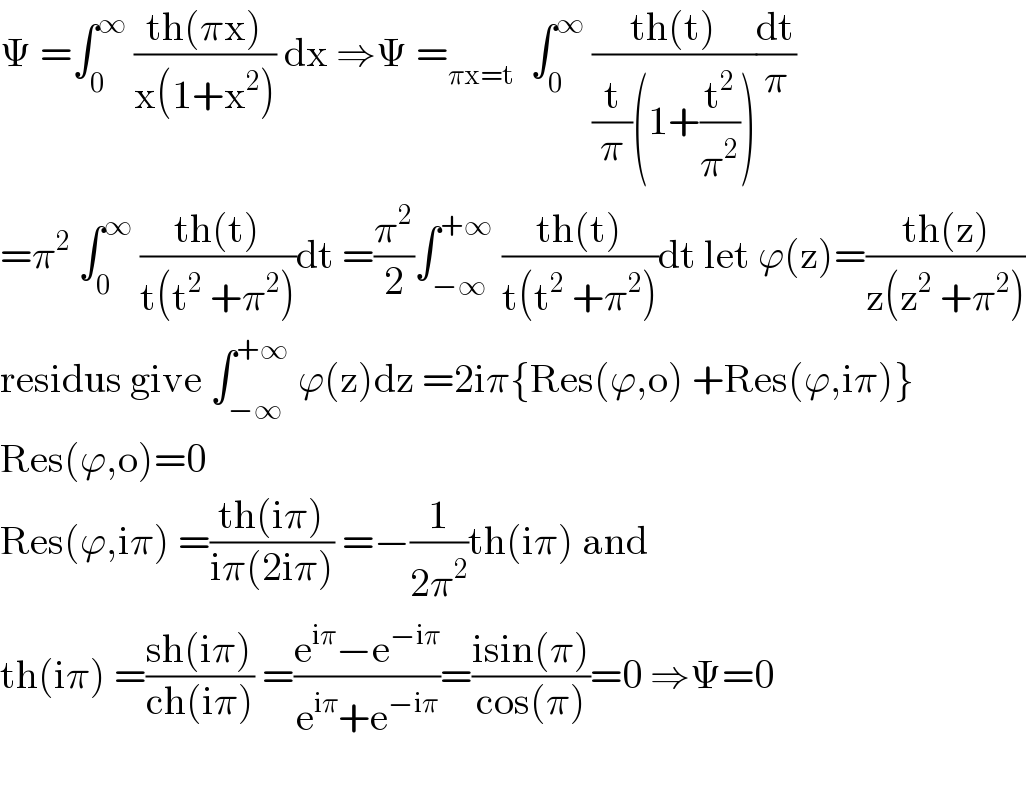
Question Number 126476 by mnjuly1970 last updated on 20/Dec/20

$$\:\:\:\:\:\:\:\:...{nice}\:\:{calculus}... \\ $$$$\:\:{calculate}\::: \\ $$$$\:\:\:\:\:\:\Omega=\int_{\mathrm{0}} ^{\:\infty} \:\frac{{tanh}\left(\pi{x}\right)}{{x}\left(\mathrm{1}+{x}^{\mathrm{2}} \right)}\:{dx}=? \\ $$
Answered by mathmax by abdo last updated on 21/Dec/20

$$\Psi\:=\int_{\mathrm{0}} ^{\infty} \:\frac{\mathrm{th}\left(\pi\mathrm{x}\right)}{\mathrm{x}\left(\mathrm{1}+\mathrm{x}^{\mathrm{2}} \right)}\:\mathrm{dx}\:\Rightarrow\Psi\:=_{\pi\mathrm{x}=\mathrm{t}} \:\:\int_{\mathrm{0}} ^{\infty} \:\frac{\mathrm{th}\left(\mathrm{t}\right)}{\frac{\mathrm{t}}{\pi}\left(\mathrm{1}+\frac{\mathrm{t}^{\mathrm{2}} }{\pi^{\mathrm{2}} }\right)}\frac{\mathrm{dt}}{\pi} \\ $$$$=\pi^{\mathrm{2}} \:\int_{\mathrm{0}} ^{\infty} \:\frac{\mathrm{th}\left(\mathrm{t}\right)}{\mathrm{t}\left(\mathrm{t}^{\mathrm{2}} \:+\pi^{\mathrm{2}} \right)}\mathrm{dt}\:=\frac{\pi^{\mathrm{2}} }{\mathrm{2}}\int_{−\infty} ^{+\infty} \:\frac{\mathrm{th}\left(\mathrm{t}\right)}{\mathrm{t}\left(\mathrm{t}^{\mathrm{2}} \:+\pi^{\mathrm{2}} \right)}\mathrm{dt}\:\mathrm{let}\:\varphi\left(\mathrm{z}\right)=\frac{\mathrm{th}\left(\mathrm{z}\right)}{\mathrm{z}\left(\mathrm{z}^{\mathrm{2}} \:+\pi^{\mathrm{2}} \right)} \\ $$$$\mathrm{residus}\:\mathrm{give}\:\int_{−\infty} ^{+\infty} \:\varphi\left(\mathrm{z}\right)\mathrm{dz}\:=\mathrm{2i}\pi\left\{\mathrm{Res}\left(\varphi,\mathrm{o}\right)\:+\mathrm{Res}\left(\varphi,\mathrm{i}\pi\right)\right\} \\ $$$$\mathrm{Res}\left(\varphi,\mathrm{o}\right)=\mathrm{0} \\ $$$$\mathrm{Res}\left(\varphi,\mathrm{i}\pi\right)\:=\frac{\mathrm{th}\left(\mathrm{i}\pi\right)}{\mathrm{i}\pi\left(\mathrm{2i}\pi\right)}\:=−\frac{\mathrm{1}}{\mathrm{2}\pi^{\mathrm{2}} }\mathrm{th}\left(\mathrm{i}\pi\right)\:\mathrm{and} \\ $$$$\mathrm{th}\left(\mathrm{i}\pi\right)\:=\frac{\mathrm{sh}\left(\mathrm{i}\pi\right)}{\mathrm{ch}\left(\mathrm{i}\pi\right)}\:=\frac{\mathrm{e}^{\mathrm{i}\pi} −\mathrm{e}^{−\mathrm{i}\pi} }{\mathrm{e}^{\mathrm{i}\pi} +\mathrm{e}^{−\mathrm{i}\pi} }=\frac{\mathrm{isin}\left(\pi\right)}{\mathrm{cos}\left(\pi\right)}=\mathrm{0}\:\Rightarrow\Psi=\mathrm{0} \\ $$$$ \\ $$
Answered by mathmax by abdo last updated on 21/Dec/20

$$\mathrm{if}\:\mathrm{you}\:\mathrm{have}\:\mathrm{another}\:\mathrm{way}\:\mathrm{post}\:\mathrm{it}\:\mathrm{sir}\:\mathrm{mnj} \\ $$
